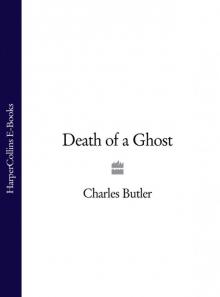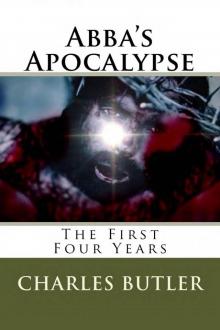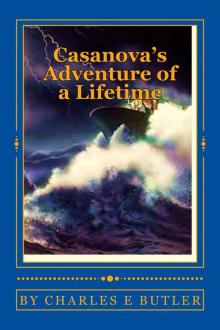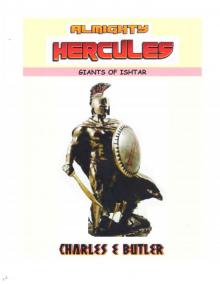- Home
- Charles Butler
Death of a Ghost Page 8
Death of a Ghost Read online
Page 8
Sue snorted. “In his dreams maybe!”
Ossian hadn’t expected that. His pride was a little hurt on his father’s behalf.
“Why not?” he protested. “She wouldn’t be the first. There’s something about being an artist, you know—”
“Ha! The agony and the ecstasy? Yes, I know all about them. We’ve had our share of both over the years, with Mum’s pets. Half the time they’re begging for handouts and the rest they want you to worship them as a kind of superior being. Mum’s not as easily impressed as she used to be. Even seven years ago she had your dad’s measure. Let’s face it, Ossian – he’s got talent, but he was never the hottest property around.”
Sue went to the cupboard to put away some plates.
“Besides,” she added haughtily over her shoulder, “what makes you imagine Mum would ever be unfaithful to my father?”
That scruple had not even occurred to Ossian. Mr Frazer – he of the shiny pate and vintage clarets – was seldom to be seen except at dinner, when his conversation revolved around flotations and foreign exchanges, shares and bonds. In his other incarnation, he was the King of the Hedge, a topiary sculptor in braces and floppy hat. Ossian had barely registered his existence. Except that now his was the loudest of the raised voices on the patio. He and Jack were rowing again, this time about chemical fertilisers.
Sue, meanwhile, had raced ahead of him. “For Mum and your dad, you should perhaps read…” stretching for a top shelf “…you and me.”
“What?”
“You’re never too young to learn. You were besotted with me the first time you came here.”
“Now, come on—” Ossian grinned, but his eyes registered a strange dismay.
“Quite a crush you had on me. Don’t tell me you’ve forgotten? Fickle boy!”
She was teasing him. Behind the teasing words Sue’s porcelain face was inscrutable. Ossian had no memory of a crush – hardly any memory of Sue at all. But it was a long time ago. There had been many girls since then. Debbie Candarino, for instance, and Emma Lomax. Lizzy!
Though Lizzy was much more than a crush, of course.
“I sometimes think,” said Sue in an abruptly melancholy and reflective way, “that you fall in love properly just once in your life. And that’s the first time. Everything else is just an echo. Variations on that theme.”
“Is there any more washing-up liquid?” Ossian asked.
“And if that’s true,” she continued dreamily, “then wherever you go, Ossian, and whoever you meet, you’ll always really be in love with me. In the corner cupboard, behind the scouring pads. Because I’m your one and only. And that, I’m sure, will be a great comfort to us both.”
LIZZY.
LIZZY. LIZZY. Lizzy. Lizzy. God knows what she’d say about it all.
And he still owed her a letter.
Ossian had been meaning to write to Lizzy for days – ever since that first, abandoned attempt. He’d promised to write as soon as he got to England and had miserably failed. He’d set aside hours, whole afternoons, for the purpose. But something had always held him back until he was too tired and hot to think of what he ought to say. He’d been carrying around that duty gracelessly, pushing it to the side of each day’s plate like an overboiled sprout. And the longer he left it, the more unappetising it became. How could he explain why he had not written in three long days?
“Don’t forget me, will you?” she had said.
It was Sue’s fault, of course. He was angry with Sue – angry for making him like her, just to show she could. And that nonsense about the Corn Stone was nothing but a new move in the game she was playing with him, a new way of landing him in the shrubbery. But he’d had enough. He was going to write Lizzy that letter – that long, proper letter – now.
He bounded up the stairs to his room, took out his good pen and the sheets of Lychfont writing paper. Dear Lizzy, he wrote. You won’t believe how much I miss you…
But now he found that something strange had happened. The more he thought of Lizzy, the less he could remember. For nine months they had been together almost every day. Jack had been out of the way, capturing the Pennsylvania scenery. Nine intimate, joyful months – and what memories had he got to show for them? One or two crept back, grudgingly. That trip to the races, for instance. He’d won 300 dollars and whooped down the street like a bank-breaking millionaire. She had made a paper crown and dubbed him King of Philadelphia Park.
He clutched the memory like a prize. That much, at least, was certain.
Or was it? Hadn’t that happened to someone else, in fact? Wasn’t it a scene from one of the short stories Lizzy kept trying to get published? He tried to remember her voice and found her phrases running through his mind like water, beyond recall.
“Come back, won’t you?”
“Do you love me, errant boy?”
“I think you’ll never understand me.”
His pen hung drably over the paper:
Oh, Lizzy, how I wish I’d never left…
THE BRAZEN HEAD was proving troublesome. Obtaining the raw materials had been hard enough – gruesome, even. Sulis had not been able to watch at times. But there had been a kind of fascination in seeing the scryer work. He was undoubtedly a craftsman and Sulis appreciated all displays of skill. He had made the cast cunningly with earth, oil and tight-packed plaster. He had painted the metal nose and cheeks, given it ruby lips and jet-black hair (which echoed hollowly when tapped with Sulis’s ivory wand), then set it securely on a wooden platform. Since he had brought the Head back to Sulis’s kitchen at Lychfont, however, his plan had faltered.
Very ceremoniously, the scryer lit a green fire under its neck. A slow hiss of sandalwood scented the room. At last, the metal became scalding to the touch and smoke streamed from the eye holes.
“Pretty,” said Sulis. She sat in a robe, sniffing. The smoke of the sandalwood made her eyes stream. But the Head’s resemblance to her lost Ossian threatened to draw forth true tears. How could love and hate exist in such proximity? Her fate – hers and Ossian’s – were tragically entwined, to be sure. The faithless wretch!
The scryer smiled indulgently at his patroness. “Your sympathy, madam, will surely draw the loved one to you,” he said tactfully. Quite different from the crisp voice he used now, turning to his creation.
“Who is your master?” he demanded of the Brazen Head.
No answer came at first. The scryer stood in uncertainty. His face reddened. Then, at last, a faint voice echoed, from somewhere deep down and far away. Rapidly the sound grew louder and harder, as if hurtling upward through a long brass tunnel, and at length it issued from the red lips of the Head:
“YOU ARE MY MASTER!” it clanged.
The scryer smiled. “That is good. I command you then to tell me the truth. But a little more quietly, please. Where may we find the man we seek?”
After some more gargling, the Head mumbled: “I do not understand.”
“Where is Ossian?”
“OSSIAN! OSSIAN! OSSIAN! OSSIAN! OSSIAN!” the Head repeated, beating out the name again and again like a flail.
“That’s a great help!” sneered Sulis. The scryer gave the Head a blow with the flat side of his stick. The noise abruptly ceased.
The scryer grunted. “Let’s try another approach. Head, what is the scope of your knowledge?”
No answer.
“Do your powers end suddenly or with a gradual diminution over space or time?”
“I know that, but I will not tell you,” declared the Head firmly.
“Who does it think it is?” cried Sulis.
“No cause for alarm, lady. Some reluctance is only to be expected.” Nevertheless, it was with a degree of exasperation that he asked: “Head, is there some boon you would ask of us?”
“To outlive a mayfly,” echoed the Brazen Head.
“I suppose that passes for humour in the land of the dead,” said Sulis. She turned impatiently to the scryer. “This Head of yours is imperti
nent. And totally unhelpful, which is worse.”
The scryer hit the obstreperous Head again.
“Ingrate! I gave you life!”
“Baaaaarn!” The Head groaned – a rasp of metal on metal, deep within its brazen skull. “I—I—I—I—I—I!”
“And now it’s playing for sympathy!”
“Quiet!” hissed the scryer. He motioned her away distractedly. Sulis snorted, but complied. She paced the room a while, then stepped outside and took her favourite walk, where the osiers, twisted with clematis and honeysuckle, shaded her and the camomile sprang underfoot all the way to the river’s edge. There was her island with its little tower, delightful. She would rest there a while, until the scryer’s task was done. The part she had played in acquiring the Head had not been a pleasant one and she wished to put the memory of it from her for a time.
In truth, she had also tired of the scryer’s company and conversation. His words grated on her no less than those of his ridiculous Head. Before. After. Then. Now. Cause. Effect. Her own head quite spun with it all. To think in such narrow terms was surely unnatural, a thinning somehow of the true richness of things, a wretched truncation, a sad—
She hesitated. What was the word the scryer had used? Impoverishment. Yes, that described it rather well. A sad impoverishment. But why had Ossian preferred a life of deceiving shadows to one of infinite clarity – with her? It made no sense, or sense only of the most ghastly and perverted kind. It was with great difficulty that she forced herself to face the question.
Could he really have ceased to love her?
She climbed the tower nimbly. Never. He never could, not him. Never, never, never.
This was as close as Sulis ever came to pondering her own feelings. For her, self-knowledge was as free and open as the air. Wisdom was simply another word for her own actions and their results. She had her secrets, yes, and sacred mysteries; but she had no landscape of the mind and needed none, her nature being so perfectly expressed in this estate of Lychfont. That was why Ossian’s crime could not be overlooked. Then or now, here or elsewhere, Ossian was part of that landscape, part of Sulis herself. She could hardly believe that the scryer did not understand all this instinctively.
In her tower she lay with her face to the sun. She dreamt, indeed, of Ossian as she loved to think of him, ardent and rosy-cheeked, fresh from the hunt. She was in love and trying so hard to make him love her back, planting sweet kisses on his tender neck. He struggled and twisted but relented at the last… Sweet victory! She smiled as she dreamt of it.
When Alaris came to tell her mistress that the Head had revealed Ossian’s first and last hiding place, she found Sulis already asleep and murmuring his name. Alaris turned discreetly and made her way back down the willow ladder. She would not for all the world have waked her.
Three
OSSIAN HAD BEEN proud to go on that journey. It was not for everyone to take. All in white, he stood in the coracle, the boatman before him, the priest his father at his back. The others were already on the island, coaxing the fire. The land rippled slightly as they crossed the running current, but Ossian did not sit. He stood astride the vessel – vibrant, alert.
It pleased him to think of his envious friends, back in the village. They could see him from its outskirts, if they climbed the Stone of Cernunnos. Madoc and Beli, they might dare. Seth would not. She feared the Stone. The boat ran into the soft island mud. Ropes and poles were hauling it ashore, while an elder handed Ossian’s father to the loose shingle. A path had been worn through the undergrowth. The trees grew thick at the top of the bank, impenetrable except where the osier branches had been stripped of their green and twined into a low arch. Ossian bowed and entered.
Beyond the archway a grass track looped the island. It was some ten paces wide at its broadest – edged by the water and a flimsy inner fence of rushes. Ossian dawdled beside a small hut where his father stored the implements of leather, gold and bronze. The old man lifted the curtain and let him touch them: the torques, the sacerdotal flail, the Cup of Potencies. Ossian was awed, but puzzled too. He had expected to find more, remembering the war booty that had made its way to the island over the years. The weapons and brooches were sacred to the river – but surely the goddess would keep something back for herself? He supposed they were piled inside that rush fence.
The priest admonished him: “You are honoured. The goddess has shown you special favour or I would not have brought you here for another year at least. Acknowledge that with your behaviour. Be brave, devout and pleasant.”
“Father, I will.”
His father went to talk with the three novices whose birth and prowess had fitted them to Sulis’s service. The young men huddled by the fence of rushes, fearful of what might lie inside. Ossian was still just too young for that. Another blessing; he had no wish yet to meet the goddess face to face. He explored the island instead. It took no more than five minutes. At its far end, where the river met itself again and spun off to the sea, a pair of swans was nesting. They ignored him until he approached the nest too close, and then hissed and chased with their arm-thick necks thrust forward. Hastily, he returned to the inlet where he had disembarked. He looked at the fence of rushes once again. There was no one about. The novices would be inside by now, his father too. The latch was loose on the nearest gate. He put out his hand to loosen it further, when—
“Ahh!”
Across the back of his hand was a track of white flesh, red-beaded where his father’s flail had caught.
“That is the holy place!” said his father. He was hoarse with anger and fear. “Not for you!”
“I only wanted to see—” Ossian began, eyes welling.
“Your fingers are dung! Your eyes would pollute her!”
He left Ossian sobbing at the doorway.
Minutes later his father returned and found the rag of a boy crouched under the sharp alders. The goddess had pitied him, he said. He kissed Ossian and forgave him, and gained his fervent promise never to enter the enclosure until he should be called there.
“When you will be a wise and powerful priest. So my stones tell me.”
But later, when the sun’s fire dimmed and midges were dancing on the river, when the trout had risen and the wind was sifting the willows’ thinness – then Ossian heard her small cloaked voice. No larger than a chestnut bud, than his own heartbeat – it cried out, desolate:
“Husband! Lover!”
He ran back to the rush fence. It looked flimsy. Each year that fence had to be renewed – his father’s task. They could have built a temple of stone, his father had told him, but a goddess should not need stone to guard her holy place. It would shame her people. That was why they left the spoils of war to the rain and crows, free for all to see. No one would touch them; their piety was protection enough. Pity the foreign gods, his father would say. Pity the gods of the south, with their temples of iron and marble. Sulis’s weakness is more mighty than their strength.
But she had called him from within the fence.
“Husband! Brother!”
There was no mistake. Sulis – yes! his Sulis – was afraid.
He did not wait. His body was strong and the goddess had called only to him. Her light shone at his brow, danced like the river midges. He was transfigured, tall. In that moment he remembered whose consort he was and what feats were his to perform. He could vault that fence to save her. He could pull the sky down upon her enemies, throw stars like slingshot. He was Cynan and Bel and Bran. He could, could…
…could nothing. The light at his brow faded and left him Ossian again, cold and small on the midge-ridden island.
He skulked to the gate where the latch was still loose. There was no guard, for Sulis’s sanctity should require none. But there were people. He knew their voices, and he knew the sticky smell of pitch, and the torchlight.
He bent and crooked his face to see inside.
THE SUN, RISEN not so long ago, had laid the chimneys of Lychfont down in d
amp plaits of shadow across the grass. Jack Purdey was sketching at his balcony, using charcoal and rough paper to put leaves on trees, deck hedges and plant swans on the just-visible water. He worked fast to catch the light in each of its gradations, grasped like a child at the lifting of each veil. There was no noise of traffic and the lawn’s dew was undisturbed, but a digger chugged in the distance and its gear-changes reached him in chesty splutters of effort. Jack pursed his lip. The machine was spoiling his concentration. Probably something to do with that damned marina, he decided.
Below him, on the patio, there was no one. Only the echoes of last night’s conversation swirled between the legs of chairs and tables, blown with the rest of that day’s litter. Once or twice he started at the sound of stifled laughter. Once or twice he sighed.
So much for The Golden Age, he thought wryly. He did not think they would be staying in Lychfont very long. Cathy’s idiot of a husband had made that plain last night. Jack groaned. Organo-phosphates! What a thing to have a stand-up row about! But he was not going to sneak away like some chastised schoolboy. As if he were ashamed. He was not – he was quietly angry, that was all, and his exit would be dignified.
Now he was distracted too, because he had just spotted Ossian at the edge of the lawn, walking very determinedly towards the woods. He was carrying his good camera with the telephoto lens – a sure sign he would not reappear for several hours. Wriggling out of being a shepherd again, thought Jack with slight irritation. Not that it mattered now. There were too many egos in this Arcadia. His commission would never be completed. He returned to his sketch. And – funny! There was Colin too. Colin was following Ossian, but at a distance and furtively, as if he did not want to be seen. Jack was an inquisitive man and would normally have found all this intriguing. Today they were spoiling his landscape. Oh, well, they’re gone now, he consoled himself as Colin disappeared amongst the trees. No great harm done, except—

 Death of a Ghost
Death of a Ghost Abba's Apocalypse
Abba's Apocalypse Casanova's Adventure of a Lifetme
Casanova's Adventure of a Lifetme Almighty Hercules
Almighty Hercules